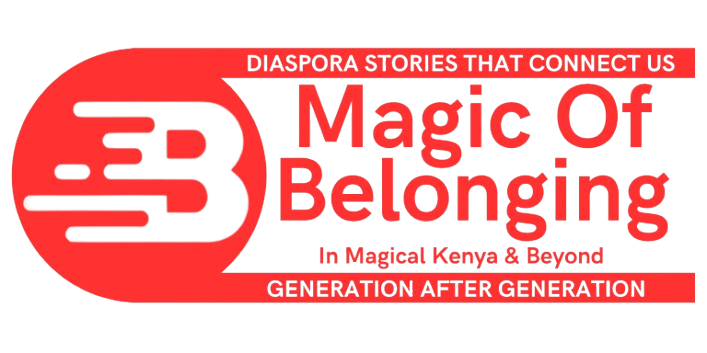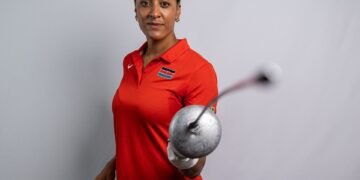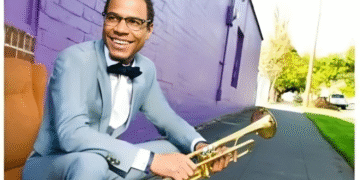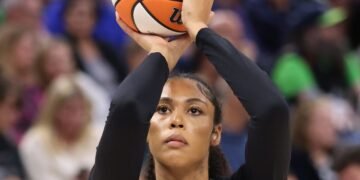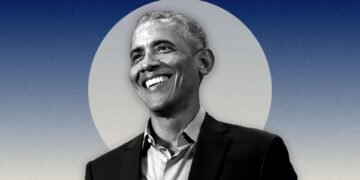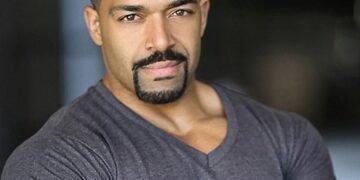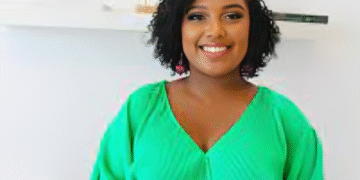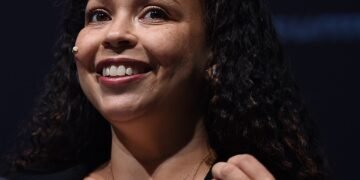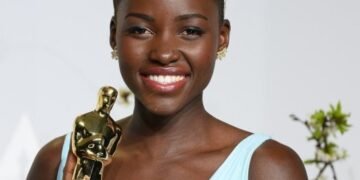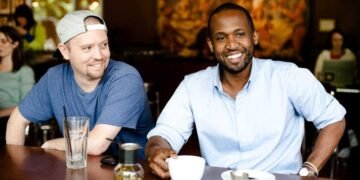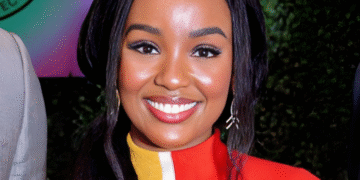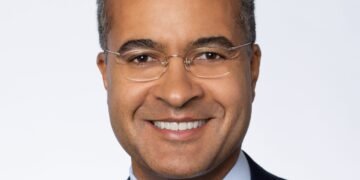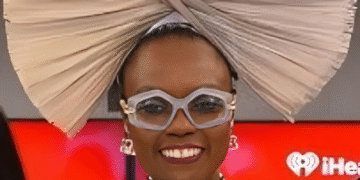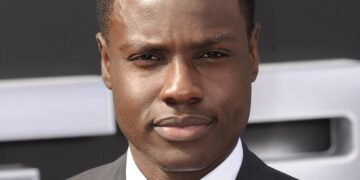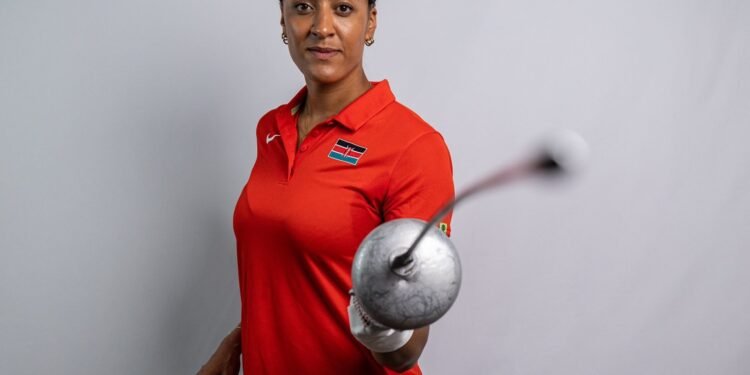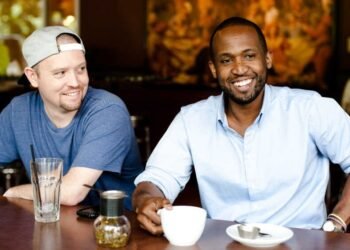In the early morning hours of July 27, 2024, as the lights inside Paris’s Grand Palais illuminated the fencing piste, Alexandra Ndolo stood still. Clad in Kenya’s red, black, and green, épée in hand, she wasn’t just preparing for a bout—she was stepping into history. Behind her stood not just the hopes of a nation making its Olympic fencing debut, but the long shadow of a father’s unfulfilled dream, and the dual inheritance of a woman raised between worlds.
For Alexandra, that moment wasn’t the beginning. It was the homecoming.
Roots in Two Worlds: A Scholar’s Legacy
Born in Bayreuth, Germany in 1986, Alexandra Marie Ndolo grew up in a house where the Polish traditions of her mother mingled with the whispered Swahili of her late father, Donald Ndolo—a brilliant linguist from Seme, Kisumu County in Kenya. Donald, a man fluent in six languages, had crossed continents on a mission of knowledge, earning degrees in Poland and Germany. His was the quiet migration story of books over battles—an academic bridge-builder who believed in the power of learning.
But Donald passed away in 1996, when Alexandra was just ten. In his absence, Kenya became less of a memory and more of a mystery. Alexandra grew up German, yet something always tugged at her—the sound of her surname, the stories of her father, the feeling that a piece of her life still waited on the other side of the world.

From Pentathlon to Piste: Finding Her Fight
Her entry into fencing was accidental. At nine years old, watching her sister train in modern pentathlon, she caught her first glimpse of fencing and was instantly captivated. “There is no time to blink,” she would later say. “Fencing demands everything—precision, intuition, courage.”
But fencing wasn’t a cheap sport. She waited until she was 21 to begin serious training, relocating to Bonn, determined to make it work. Her left-handed technique became a signature advantage, and year by year, she climbed the ranks—quietly, steadily, fiercely.
“There is no time to blink,” she would later say. “Fencing demands everything—precision, intuition, courage.”
Representing Germany, she won silver at the 2017 European Championships, bronze in 2019, and then, in 2022, the silver medal at the Fencing World Championships in Cairo—her greatest triumph yet.
And yet, something stirred. That same week, a young Kenyan fencer named Isaac Wanyoike competed for the first time at the World Championships. Watching him, Alexandra felt an ache that no podium could quiet. “I had mixed emotions,” she said. “The Kenyan flag was there… but I had won a medal for Germany.”
The Spark Returns to Kenya
Her first real visit to Kenya in 2014 had been eye-opening. The warmth, the culture, the potential—it all felt so familiar, and yet so far. While fencing was virtually unknown in Kenya, Alexandra saw something few others did: a blank canvas.
She started small—sending donated equipment, writing messages of encouragement, introducing the sport where no one had heard of it. But the dream grew. In 2019, she helped found the Kenya Fencing Federation, securing official affiliation with the International Fencing Federation and Kenya’s National Olympic Committee.
Then came the pandemic—and clarity. “I realized fencing would take time to grow in Kenya. Until then, I had to be that champion.”
So, in 2022, weeks after her World Championship silver, Alexandra made an extraordinary choice: she would leave Germany’s elite fencing program and switch her allegiance to Kenya.
It wasn’t a symbolic gesture. She walked away from financial stability, sports funding, and elite training support. Her mother, Polish and proud, stepped in to help. “When I ran out of money, she took over,” Alexandra said. “Right now, my sweet lovely Polish-born mother is raising the Kenyan flag high.”
Alexandra made an extraordinary choice: she would leave Germany’s elite fencing program and switch her allegiance to Kenya.
One Woman, One Federation, One Flag
Her first tournament representing Kenya was in Estonia. As “Kenya” was announced and the flag rose above the piste, tears welled in her eyes. “It hit me like a wave,” she said. “I felt my father there with me.”
In that moment, fencing became more than sport. It became a tribute.
She placed 10th out of 275 athletes—history made. And she kept climbing. In 2023, she qualified for the Paris Olympics as Africa’s top-ranked épée fencer.
But the road wasn’t smooth.
Funding fell through. At some competitions, she found she wasn’t even properly registered. Miscommunication with Kenya’s young fencing federation led to public tension. “I was relying on things I was told,” she said with grace. “There were growing pains.”
Still, she pressed on. Her mother kept supporting her. And her mission never wavered.
Paris 2024: More Than a Medal
At 5:40 am on July 27, 2024, Alexandra stepped onto the Olympic piste against Ukraine’s Olena Kryvytska. She fought with the weight of two continents behind her—and lost 13–12.
But that single-point defeat did not define her legacy. She had already won, long before Paris.
She had brought fencing to Huruma, a Nairobi neighborhood where kids now don masks and wield épées instead of makeshift weapons. She had given young Kenyans a new image of athletic possibility. And she had honored her father, not with a eulogy, but with a flag.
“If in 30 years fencing is thriving in Kenya, that’s enough,” she said. “That will be my podium.”
A New Kind of Victory
Donald Ndolo once crossed the globe to teach. His daughter now crosses it to inspire. Where he built classrooms with language, she builds arenas with steel. Where he opened minds, she opens dreams.
From Kisumu to Cologne, from Bayreuth to Huruma, Alexandra’s story is a reminder that belonging is not just where you’re born—it’s where you choose to build.
Her blade has carved a path where none existed, not just for herself, but for Kenya’s next generation of athletes, dreamers, and doers.
And somewhere—on a faraway bookshelf or in the quiet of a fencing salle—Donald Ndolo’s dream lives on. Not in a degree, but in a daughter who made the whole world her classroom.
